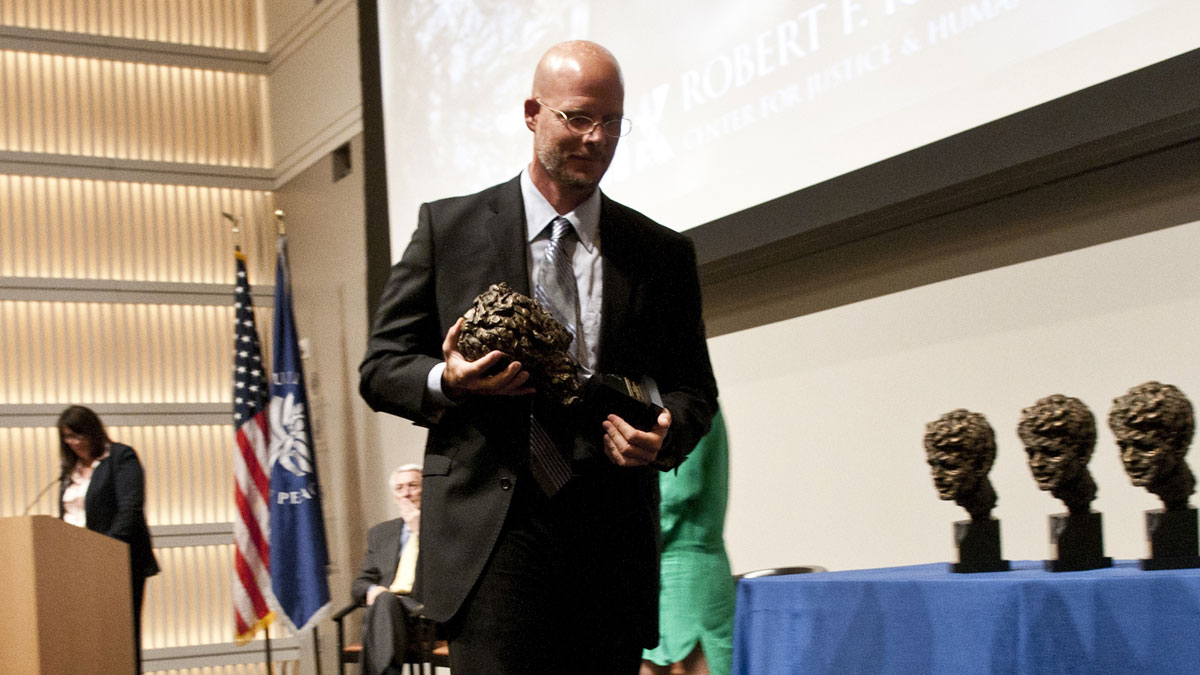NPR in mourning after David Gilkey killed in Afghanistan
Photographer and his interpreter came under fire while travelling with an Afghan army unit

A free daily email with the biggest news stories of the day – and the best features from TheWeek.com
You are now subscribed
Your newsletter sign-up was successful
America's National Public Radio (NPR) is mourning the loss of its award-winning photojournalist David Gilkey, who was killed in Afghanistan over the weekend.
His Afghan interpreter, Zabihullah Tamanna, who also worked as a journalist for the network, was killed as well.
They were travelling with an Afghan army unit near Marjah in Helmand province yesterday afternoon when the convoy came under fire and their vehicle was struck, according to the network.
The Week
Escape your echo chamber. Get the facts behind the news, plus analysis from multiple perspectives.

Sign up for The Week's Free Newsletters
From our morning news briefing to a weekly Good News Newsletter, get the best of The Week delivered directly to your inbox.
From our morning news briefing to a weekly Good News Newsletter, get the best of The Week delivered directly to your inbox.
Two other NPR journalists, Tom Bowman and producer Monika Evstatieva, were travelling with them but escaped unhurt.
"On Sunday, we lost one of our own," reads a moving statement on the NPR website.
David "brought us the world and made us all care", says the tribute, which describes Gilkey's photographs and videos as "haunting in their beauty and poignant in their nuance".
Veteran correspondent Phillip Reeves, who recruited Tamanna to NPR, called him "a great colleague".
A free daily email with the biggest news stories of the day – and the best features from TheWeek.com
"He was a lovely man, with a great eye for a story and deep wisdom about his country," Reeves said in a statement.
Afghanistan's President Ashraf Ghani has called the attack cowardly and "completely against all the principles and values of Islam and humanity, and against all international laws".
US Secretary of State John Kerry described it as "a grim reminder" of the danger facing the Afghan people and of the "courage of intrepid journalists – and their interpreters – who are trying to convey that important story to the rest of the world".
Al-Jazeera journalist Rawya Rageh said Gilkey's rare talent was "something else". His images were always striking, whether he was capturing the actions of pandas in adorable videos or the horrors of war in Iraq and Afghanistan.
Gilkey was one of the first photographers to go to Afghanistan when the US invaded in 2001, and he was later embedded with US army units in Iraq. He also covered the 2009 Gaza war between Israel and Hamas, the 2010 earthquake in Haiti, the 2015 Ebola epidemic in Liberia, and conflicts in Rwanda, the Balkans and Somalia.
NPR's deputy political editor Arnie Seipel posted a video of Gilkey on Twitter in which he reflects on his work in Haiti following an earthquake in January 2010 that left the capital in ruins.
Of his time in Haiti, Gilkey said that his work was not just about reporting or taking pictures, it was about considering whether those visuals and stories changed people's minds enough to take action.
Gilkey said: "If we're doing our part, it gets people to do their part. Hopefully."NPR is holding a minute's silence today.
-
 One great cookbook: Joshua McFadden’s ‘Six Seasons of Pasta’
One great cookbook: Joshua McFadden’s ‘Six Seasons of Pasta’the week recommends The pasta you know and love. But ever so much better.
-
 Scientists are worried about amoebas
Scientists are worried about amoebasUnder the radar Small and very mighty
-
 Buddhist monks’ US walk for peace
Buddhist monks’ US walk for peaceUnder the Radar Crowds have turned out on the roads from California to Washington and ‘millions are finding hope in their journey’